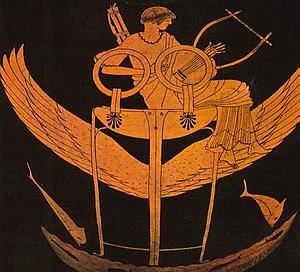Apollo in Greek Imagery and Text

|
Click
here (choose "open in new
window") to go to the discussion of this image and the texts below by
Professor Dué-Hackney of the University of Houston. You will need
quicktime to play this*
|
Red-figure hydria, by Berlin
Painter, c. 490 B.C. Apollo seated on a tripod.
|
If you don't have quicktime (most machines
do), go to www.apple.com/quicktime for a free download.
|
Passages Associated with Apollo iconography
discussion:
Homeric Hymn
to Apollo 1-4: I will remember and not be unmindful
of Apollo who shoots afar. As he goes through the house of Zeus, the gods tremble
before him and all spring up from their seats when he draws near, as he bends
his bright bow.
Iliad 1.1-11: SING, O goddess, the anger of Achilles son of Peleus, that
brought countless ills upon the Achaeans. Many a brave soul did it send hurrying
down to Hades, and many a hero did it yield a prey to dogs and vultures, for
so was the will of Zeus fulfilled from the day on which the son of Atreus, king
of men, and great Achilles, first fell out with one another. And which of the
gods was it that set them on to quarrel? It was Apollo, the son of Zeus and
Leto; for he was angry with the king and sent a pestilence upon the host to
plague the people, because the son of Atreus had dishonored Chryses, his priest.
Homeric Hymn to Apollo 130ff: Phoebus Apollo spoke out among the deathless
goddesses: "The lyre and the curved bow shall ever be dear to me, and I will
declare to men the unfailing will of Zeus."
Homeric Hymn to Apollo 475-501: “Strangers who once dwelt about
wooded Knossos but now shall return no more each to his loved city and fair
house and dear wife; here shall you keep my rich temple that is honored by many
men. I am the son of Zeus; Apollo is my name: but you I brought here over the
wide gulf of the sea, meaning you no hurt; nay, here you shall keep my rich
temple that is greatly honored among men, and you shall know the plans of the
deathless gods, and by their will you shall be honored continually for all time.
And now come, make haste and do as I say. First loose the sheets and lower the
sail, and then draw the swift ship up upon the land. Take out your goods and
the gear of the straight ship, and make an altar upon the beach of the sea:
light fire upon it and make an offering of white meal. Next, stand side by side
around the altar and pray: and in as much as at the first on the hazy sea I
sprang upon the swift ship in the form of a dolphin, pray to me as Apollo Delphinius;
also the altar itself shall be called Delphinius and overlooking for ever. Afterwards,
sup beside your dark ship and pour an offering to the blessed gods who dwell
on Olympus. But when you have put away craving for sweet food, come with me
singing the hymn Ie Paean (Hail, Healer!), until you come to the place
where you shall keep my rich temple."

